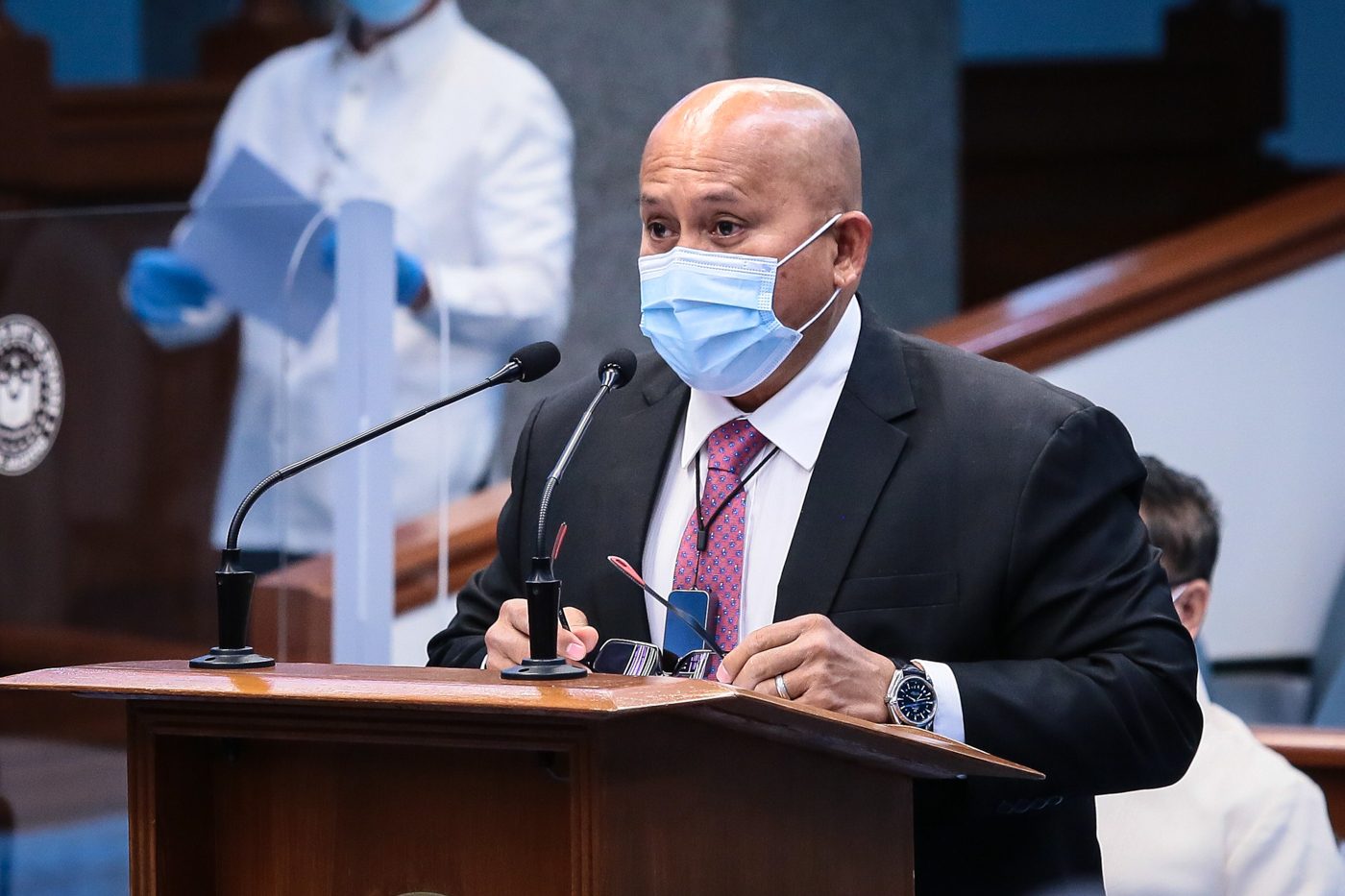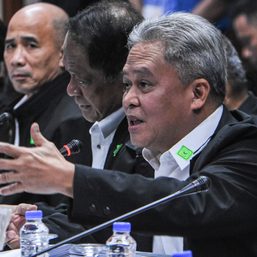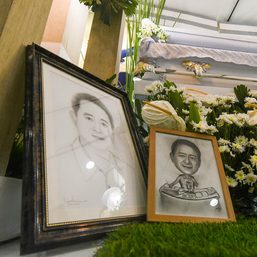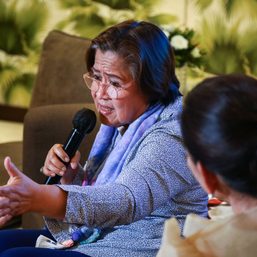SUMMARY
This is AI generated summarization, which may have errors. For context, always refer to the full article.

Senator Ronald “Bato” dela Rosa on Wednesday, July 29, secured a seat in the Senate committee on justice and human rights, making him eligible to sponsor a bill to reinstate the death penalty.
Dela Rosa, former chief of the Philippine National Police (PNP) and the Bureau of Corrections (BuCor), echoed President Rodrigo Duterte’s recent State of the Nation Address in which he urged Congress to restore capital punishment for illegal drug offenses.
In a privilege speech during the Senate’s session on Wednesday afternoon, Dela Rosa appealed to his fellow senators “at the very least, to deliberate on the issue of the death penalty in the country.” (READ: Death penalty unlikely to hurdle Senate unless limited to drug lords – Sotto)
Billions of pesos worth of illegal drugs continue to be smuggled into the Philippines, “demonstrating the callous consciences of drug offenders,” Dela Rosa said. He cited several arrests of drug traffickers in different parts of the country, which he credited to “the highly sensitive intelligence work of the PNP and the PDEA (Philippine Drug Enforcement Agency), and their close coordination with other law enforcement agencies.”
The senator said a “prominent Chinese convicted drug lord” imprisoned at the New Bilibid Prison told him that only reinstating the death penalty would “truly compel” drug traffickers to stop.
According to Dela Rosa, the drug convict said traffickers prefer to “flood” the Philippines with shabu (crystal meth) because they have no death penalty to fear, and they are able to carry on their trade even in prison.
Because the drug convicts retain their right to be visited by their families, they are able to run their drug businesses through their spouses or children, whom they get to speak with regularly, face-to-face. That is why cutting telecommunication lines and confiscating mobile phones couldn’t stop the drug trade in the national penitentiary, Dela Rosa said.
“Sir, kung gusto ’nyo talagang matakot kami na mag-traffic ng drugs sa Pilipinas, ibalik ’nyo ang death penalty,” the drug convict supposed said to Dela Rosa. (Sir, if you really want to deter us from trafficking drugs, bring back the death penalty.)
Often, Chinese traffickers smuggle drugs or precursors from China into the Philippines, and then leave the sale and distribution to Bilibid convicts. “Every time a big haul of drugs were confiscated anywhere in the Philippines, it traces back inside the Bilibid,” Dela Rosa added.
Citing PNP data, Dela Rosa said the crime rate declined significantly from 1993 to 2005, the years the death penalty was in effect, and “horribly increased” after 2006, when the law was suspended.
These qualify as ”compelling reasons involving heinous crimes,” which the 1987 Constitution states as justification for reinstating the death penalty, Dela Rosa argued.
He noted that the Philippines’ ratification of the International Covenant on Civil and Political Rights prevents it from imposing capital punishment, but asked his colleagues to consider it in light of “one of the grievous ills in our society, which is drug trafficking.”
After his speech, Dela Rosa offered to lead a sub-committee of the committee on justice and human rights, and sponsor a Senate bill to reinstate the death penalty. Senator Richard Gordon, the committee chair, opposes the death penalty and would not sponsor the measure. (READ: Why the death penalty is unnecessary, anti-poor, error-prone)
However, Senate rules require a senator to be a member of the appropriate committee in order to sponsor a bill.
At the end of Wednesday’s session, Senator Sherwin Gatchalian relinquished his membership in the justice and human rights committee to give way to Dela Rosa. None of the other senators opposed it.
Committee membership allows Dela Rosa to sponsor the measure if the chair – Gordon – permits it, and then vote on its approval.
Gordon, for his part, said he can “objectively” conduct committee hearings on the death penalty even if he does not sponsor it.
Senate President Vicente Sotto III earlier said the Senate is unlikely to pass a measure restoring the death penalty anytime soon, unless its application is limited to “high-level drug traffickers.”
Pangilinan: Why during a pandemic?
Opposition Senator Francis Pangilinan questioned the timing of Dela Rosa’s proposal. Is it right to tackle reimposing the death penalty during a pandemic?
“Itong isyung aking inire-raise ngayon, it is also considered a global pandemic, itong drug problem. So hindi naman siguro ibig sabihin na porke tayo’y may kinakaharap na global pandemic na COVID-19, hihinto na lang tayo sa paggawa ng ibang batas para sa ibang mga issues na kinakaharap ng ating lipunan at doon na lang tayo mag-concentrate,” Dela Rosa responded to Pangilinan’s interpellation.
(This issue that I am raising now, it is also considered a global pandemic, this drug problem. So perhaps it doesn’t mean that just because we’re facing the COVID-19 global pandemic, we will stop making laws on other issues confronting our society and just concentrate on that.)
Dela Rosa jabbed at Pangilinan for having been the lone dissenter when the Senate approved on 3rd and final reading on Tuesday, July 28, the Bayanihan to Recover as One Act or “Bayanihan 2” – the continuation of the administration’s program on the COVID-19 pandemic.
If Pangilinan really wanted to address the pandemic, then he should have voted to pass Bayanihan 2, Dela Rosa said. Pangilinan earlier explained that he opposed Bayanihan 2 because he believed the administration’s strategy had been ineffective, and he didn’t want to entrust the measure’s P140-billion standby fund to Health Secretary Francisco Duque III, whom he thought should resign.
“With all due respect, I think our Senate can do multitasking…. We did make laws [on the pandemic] – Bayanihan 1 and Bayanihan 2. What more can we ask from the Senate?” Dela Rosa said, in a mix of English and Filipino.
The Senate has yet to come up with its counterparts of bills on long-term economic recovery and stimulus programs in the wake of the pandemic. Bayanihan 2 will lapse on September 30.
Pangilinan then pointed out Dela Rosa’s claim that billions of pesos worth of drugs continue to flood the country despite the war on drugs, which Dela Rosa enforced when he was police chief.
Rights groups estimate more than 20,000 people have been killed in Duterte’s drug war.
“Can we then say that Oplan Tokhang is ineffective? It’s been 4 years,” Pangilinan asked Dela Rosa.
It’s a subjective question, Dela Rosa answered, insisting the campaign has been “very effective.”
And it’s precisely the reason he wants to bring back the death penalty, Dela Rosa added.
“’Yang mga drug lord sa Bilibid, kung ’yan ay pinagbibitay na natin noon pa, matagal na sanang nawala itong ating problema sa droga…. Kaya lang, naging ineffective ’yung ating total campaign dahil wala tayong death penalty,” Dela Rosa said.
(Those drug lords in the Bilibid, if we had only executed them, then this drug problem would have long disappeared…. The thing is, our total campaign became ineffective because we don’t have the death penalty.)
But what did Dela Rosa do as BuCor chief when he learned that Bilibid convicts continued dealing in drugs through “face-to-face” meetings with their families?
He enlisted Chinese assets to eavesdrop on the convicts’ conversations during family visits, Dela Rosa said. It led to some big intercepts, and yielded information on the “drug cartel” inside the Bilibid.
“At huwag kayo magduda. I bet my whole life dito sa laban ko sa droga na ito. Never na never akong magpabaya sa aking trabaho kung ito’y nalaman ko. At hindi ko puwede sabihin na iyo lahat kung anong ginawa ko nung nalaman ko,” Dela Rosa told Pangilinan.
(And don’t doubt it. I bet my whole life on this fight against drugs. I would never neglect my work if I found this out. And I cannot tell you everything I did when I found out.) – Rappler.com
Add a comment
How does this make you feel?

![[Under 3 Minutes] Silip sa loob ng Bilibid](https://www.rappler.com/tachyon/2024/01/title-card-ls-1.jpg?resize=257%2C257&crop=420px%2C0px%2C1080px%2C1080px)






![[WATCH] Bamban POGO scandal: There’s a bigger fish than Alice Guo](https://www.rappler.com/tachyon/2024/07/inside-track-tcard-bamban-pogo.jpg?resize=257%2C257&crop=435px%2C0px%2C1080px%2C1080px)
There are no comments yet. Add your comment to start the conversation.